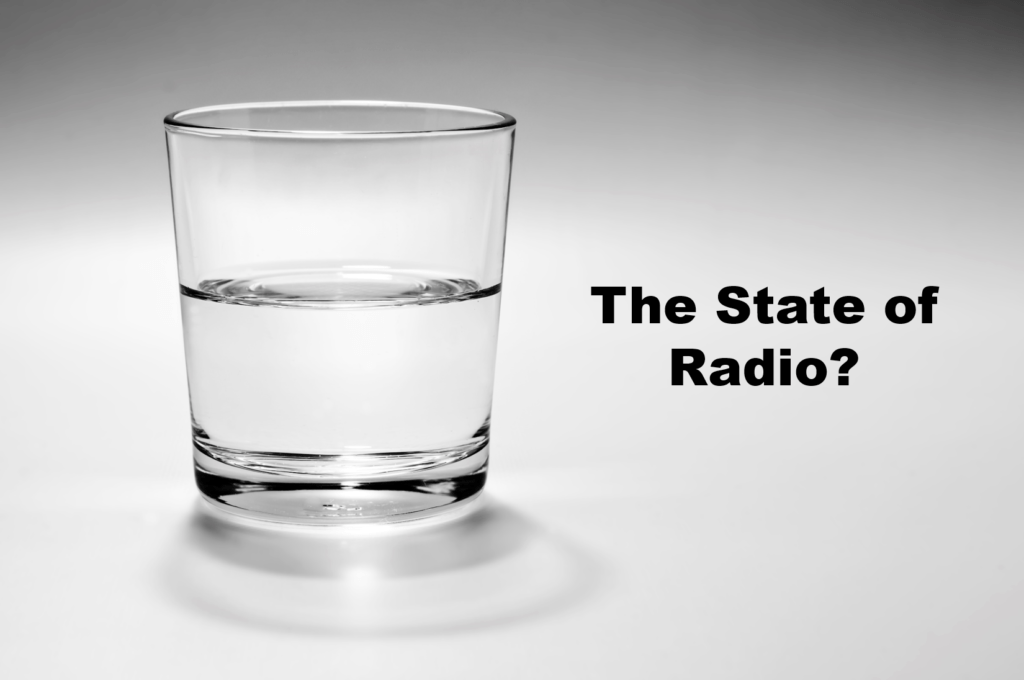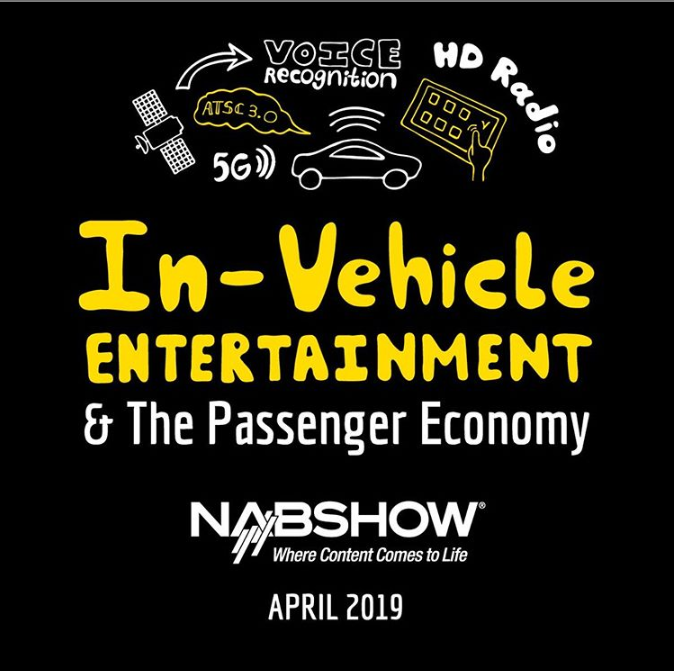
Last week, brother Paul wrote a very uplifting column about a career in radio. He listed nine wonderful benefits of working in this business, many of which I have experienced, too. Not everyone has been as fortunate or as lucky as us. Based on the many comments Paul’s post has generated here on the blog and in social media, many of you agree with his “take” on what a wild and crazy business radio can be.
As Paul mentioned in the post, he’s the glass half full guy. Me? I tend to be more cynical and jaded by many of the things I’ve witnessed and experienced over the past several decades. Don’t get me wrong – I’m an unabashed radio supporter, but also wish that as an industry, we would do better. In fact, we have to – the competition for people’s attention has only gotten fiercer.
Today’s post is dedicated to the other side of the equation – the growing list of people who are sadly running out the clock on their careers – on radio. You know from watching basketball games this strategy can be effective, but leads to a boring, low-scoring game where nothing really happens. That’s why the NBA and NCAA instituted shot clock rules – it forces the team with the ball to do something.
In life and in radio, there is no shot clock. If you can get away with it, it’s possible to run out the radio clock…for years. And sadly, too many people are doing just that. They’ve quietly set their own time limit – getting their kids through high school or college, salting away enough money to buy that country hideaway, or any number of personal reasons why they’re counting down the months or years until they can call it a day.
I have had many confide to me how they dislike the direction the radio industry has taken in recent years. And how a business that was once fun and enjoyable has become a much more challenging and even frustrating endeavor. These are voices from every walk of radio life – managers, personalities, and salespeople in both commercial and public radio.
On the one hand, I have empathy for the many people whose careers haven’t gone as planned. Or the once young swashbucklers who got into the radio business for one reason, but ended up doing something entirely different, and perhaps not as fulfilling. Or those whose dreams have been dashed by the changing business or regulatory climate.
But on the other, those who feel the future of radio is someone else’s problem ought to rethink that shaky logic. Sticking today’s radio Millennials with unsolvable dilemmas about the industry’s ultimate welfare is irresponsible. And it fails to follow through on the notion of leaving the radio in a better place than how you first found it when you entered the business.
Careers aside, there’s no question that success in the radio business is more fleeting that ever before. Economic market conditions have been challenging since the Great Recession. Broadcast radio is now under intense pressure from digital media competitors, both among audience and advertisers. And the “glow” that used to come from working in the radio business has dimmed somewhat.
I remember the days when you told someone you worked in radio, and in response you heard something like this:
“Wow – that must be fun.”
“They pay you to play your favorite music?”
“I’ll bet you get to go to all your favorite concerts.”
Today, the comebacks are more apt to sound like this:
“Does anyone listen to the radio anymore?”
“You mean SiriusXM?”
“I just hate all the commercials you guys play, always at the same time.”
Now in fairness, there are many average citizens who very much believe that being in radio still has a certain romance and charm – especially compared to the careers that many of them pursued or ended up in. They still listen every day, and while they may have discovered other entertainment and information options, they’re still very much consuming AM/FM radio.
I have less of a problem when I hear how consumers are exploring other media choices then when I encounter radio careerists who have all but given up. Or they’re simply running out the clock. That I find both disheartening and discouraging.
There’s never been a time when broadcast radio needs all of us to bring our A Games. As every CEO in the business will tell you, great ideas and innovations are at a premium. And unlike the “good old days” when not a whole lot new or different happened, today’s radio environment is fluid and very much up for grabs.
Once conservative broadcast radio companies are exploring unique partnerships and exciting acquisitions. They’re looking for ways to marshal their assets to create more content, revenue, or both. They need an injection of “new and different,” and they know it. You may not agree with the decisions you see being made by executives under more pressure than they’re ever been in their corporate lives. But you should know they’re all working overtime to figure this thing out.
And that’s where you come in. If you’re still motivated and excited to come to work every morning (or evening), you’re ahead of the curve. I’m not going to tell you that every one of your concepts, ideas, or experiments will be taken seriously by your current employer. You might have to walk out the studio door, and go across the street – or across the country. But, there’s never been a time since perhaps the 1950’s and the invasion of television where new startups and new business opportunities have a fighting chance to become realities in the broadcast radio business.
 I know I’m about to experience the “state of radio” at the NAB this week in Las Vegas. I’m headed there now, always interested to take in the mood, the vibe, and the temperature of the broadcast radio industry. I’ll be hanging at the Wynn/Encore where the CEOs hold court, attending and participating in sessions and panels, and interfacing with many clients, friends, and both.
I know I’m about to experience the “state of radio” at the NAB this week in Las Vegas. I’m headed there now, always interested to take in the mood, the vibe, and the temperature of the broadcast radio industry. I’ll be hanging at the Wynn/Encore where the CEOs hold court, attending and participating in sessions and panels, and interfacing with many clients, friends, and both.
The past few years, this mega-gathering in Sin City has taken on a decidedly upbeat tone, as more broadcast leadership has come to accept the realities of digital, and dedicated themselves and their companies to addressing the challenges – and the opportunities.
But if you’re truly at that point where you’re burned out, bummed out, or otherwise out of gas with your radio career, do me a favor. Spare me the details. Don’t even tell me about it.
That’s because I’m one of the many radio veterans trying to make it better, encouraging all of us to bring our best effort to what has become a true test of how good we really are.
And because I’m liable to suggest that if you feel this way, you consider an early exit, and make room for someone else with the youth, energy, and enthusiasm you once brought to the game.
The fact is if you’ve been a foot solider or even a commander in the “Radio Wars,’ we need your ideas and your energy now more than ever. We need your enthusiasm and support, inside the station and out in public.
And if you can’t bring it, maybe it’s time to get out of the way and let someone younger, hungrier, and more innovative take a crack at it.
The clock is ticking – not just on our careers but on the business we love.
- What To Do If Your Radio Station Goes Through A Midlife Crisis - April 25, 2025
- A 2020 Lesson?It Could All Be Gone In A Flash - April 24, 2025
- How AI Can Give Radio Personalities More…PERSONALITY - April 23, 2025




Fred Jacobs says “GET OFF MY LAWN!”
-film at 11
Great post, Fred! Have fun in Vegas, and hopefully, you’ll take in AEROSMITH!
More likely, I’ll take in a nap. Thanks, JC.
Ironic you should post this today. Here I am, on the air for almost 47 years, and I am starting a new morning show today! Again. I begin. Still happy and healthy(so blessed) after all these years. If you look at it one way, I still love ‘the fight’. I am not talking about slapping our bumper stickers on the other station’s vans as we once did. I had to learn to fight in a different way. In a different world. My Mom and Dad set the standard for my life, by telling me ‘change is good’. And it is. Have fun and thank you for your daily columns.
Many thanks, Barry. Love the attitude & best of luck with the new gig. (It’s like riding a bike, right?)
Barry-You are still doing it because you have talent, passion, and a commitment to excellence. I’m sorry we haven’t had a chance to work together since WROV… but I wish you the best in your new gig. You deserve it.
Radio has matured into a business to keep up with the changing landscape. My last official DJ programming gig was in 2002. I knew if I was going to stay in the business, management and or ownership would be the only option. I would step out for awhile and purchase two stations in 2013. The business will continue, just not like it was in 1984. It was a great time back then, but it is not coming back. Those who adapt and change will do well in the new radio landscape. Radio will be part of the multimedia platform, and stations, staff and management will need to adjust to that. Technology has simplified tasks that no longer needs large staffs or departments. That is the new reality.
Indeed, Damon. Thanks for the perspective and for reading our blog.
What an inspiring column, Fred, especially for those of us on “the back nine” of our careers!
And what a great reminder that, for all its challenges, we are truly blessed to work in such a fun, exciting industry.
Radio has been great to us. We should be no less to radio.
Well, Dave, radio’s “senior tour” should be full of broadcasters who are excited to come to work every day, ready to take on the challenges of today and tomorrow. Thanks for the kind words, and for keeping it fun and exciting.
I left radio 11 years ago to join the start up team at Stitcher. I didn’t think I would ever come back, but, I am back in radio now as VP of Podcast Programming for iHeartRadio. There are new jobs in radio and I love the new frontier of digital and what it has to offer talent and programmers if they embrace it. Great article!
Thanks, Matty. It’s a wild and crazy time in radio to be sure. As you suggest, embracing the challenges is what it’s all about.
Great column Fred. After 40 years in this business, I’ve never been more excited about where we’re headed, nor more impressed with the ideas and energy my younger co-workers bring to work every day. Radio is as fun and challenging as I’ve ever seen it, leaving only one option…lead or get out if the way.
Enjoy Vegas… can’t make it this year, but wish everyone there the best.
Norm, great to hear from you, and thanks for the encouraging words. You’re walking the walk, as always, leading the way. All the best.
Fred, I feel your pain. Just as sad are the younger ones who settle at a low water mark, as learned from the previous generation. I do love the ones who pick up on our enthusiasm and make it their own. That makes for great days and successful radio stations.
Working with young, energetic radio enthusiasts is its own reward. That’s why I enjoy attending Conclave as well as Dan Valle’s National Raido Talent System “institutes.” Thanks for the comment, Jack.
It all starts at the top. The radio industry is running out the clock – no real innovation other than cost cutting in 25. Digital you say…All the talk of digital is just that – being a manager’s rep for digital ad sales companies is worth doing, but its not innovative and won’t help radio compete with a new dashboard and a growing and improving list of online competition.
My mother used to say, “had that darned horse down to one grain of oats a day and then it died on me.”
I appreciate the viewpoint, Bob, but I see a lot more proactivity from the top now than just a couple years ago. Yes, there have been budget cutbacks at many companies, but often it’s in the form of a deployment of resources. Radio broadcasting CEOs have a lot on their plates. And a lot of difficult decisions ahead of them. Thanks for the comment.
2019 marks 53 years since I began my on-air career in commercial radio. It will also mark 15 years in non-commercial public radio as GM of perhaps the country’s most successful (from a ratings and revenue perspective) college radio station, still largely populated by students, WERS at Emerson College in Boston. The downturn in commercial radio can be directly traced to deregulation and the corporate consolidation that followed. And, at a time when alternate delivery platforms became ubiquitous. When AM radio was the primary source of new music throughout the culture, we managed to maintain long listening spans despite 18 unit hours. Then FM music stations came along and created expectations of long music sweeps with minimal interruptions. Now, when people can access music from You Tube, Spotify, and seemingly everywhere, commercial operators run 6 and 7 minute stop-sets and think listeners will stay… and like it? You’ve got to be kidding. But, as long as shareholder profits vastly outweigh what listeners want, and what serves clients best (like not being buried in the middle of the aforementioned commercial clusters), commercial radio will continue to decline in share and consumer satisfaction. Meanwhile, the average occasion of digital listening to WERS (a triple A music station) is over one hour, and our weekly TSL is 2.5 hours. We’re commercial free, live and local… and listeners have noticed. You need to cut the spot loads and create a compelling product. Otherwise, don’t turn around… public radio is gaining on you.
Jack, thanks for the insights and congratulations on a great run – for your entire career and at WERS. Public radio has made amazing gains in the past decade (especially now that they’re ratings are visible in the major market ratings reports) thanks to a focus on the listener, the community, and on new platforms, such as podcasting. We see the difference in our Net Promoter Scores across the various radio groupings. Disruption has impacted the entire industry, of course, but radio operators still have control of their UX. Appreciate the comment.
Fred, that’s high praise coming from you. I’ve often described my career as “a knife fight in a phone booth” just staying employed. But, of course, my students don’t know what a phone booth is. The good news is there are highly motivated, talented, and passionate students in colleges across the country (just ask Dan Vallie of the National Radio Talent Institute) who are considering careers in radio. I’m just hoping that the industry will have a place for them and their creativity when they graduate.
I’m upbeat about this, and believe the radio industry will eventually (and begrudgingly) come around to grasping the size, energy, and inevitability of Gen Z. Your role in recruiting, training, and pumping them up, Jack, is laudable. Like Conclave, Dan Vallie’s efforts, and the work many state broadcaster associations are doing, radio will hopefully have enough talent to recruit that brings the ability to connect with their peers.